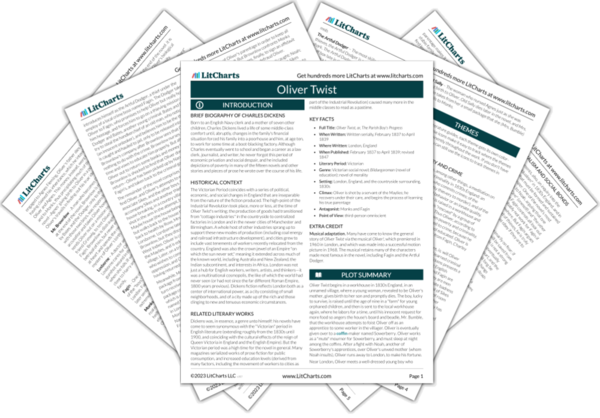Summary
Analysis
The next day at Fagin's apartment, when Noah comes to meet Fagin's "friend," with whom he is to work, he finds Fagin instead. Noah is surprised that Fagin is the "friend" he mentioned, but Fagin answers that every man is his own best friend—every man is his own "number one." Fagin explains to Noah that he must look out for two number ones, in order to be successful as a criminal: Noah himself (number one), and Fagin (the absolute number one of all).
An incredibly important scene in the novel, and one that has become, understandably, quite famous. Fagin inverts the commonplace idea that one should look out for "Number One" (oneself), by arguing that he, Fagin, is also always Number One, and so everyone should also look out for Fagin's interests.
Themes
Literary Devices
Fagin says that the more Noah values the first, the more he will have to value the second, and vice versa; Fagin also threatens Noah with hanging, at the hands of justice, if he disobeys. Fagin explains to Noah how one of his best hands, the Artful Dodger, was taken by police just the previous day, for stealing a snuff box.
As with Oliver, Fagin threatens Noah, again, with the prospect of hanging, should Noah find it necessary to "peach," or rat out the remainder of the group. This is how fear keeps the band of criminals together. But that fear is all that keeps the gang forever, in contrast to the bonds of love that Oliver seems able to forge between people.
Themes
Charley Bates comes to Fagin to inform him that the police have additional evidence against the Dodger linking him to other thefts—this means he will be sent away for a long time, possibly to a penal colony. Bates is upset—not his usual laughing self—and cries to Fagin that no one will know of all the Dodger's wonderful thefts and deeds. Fagin replies, however, that the trial is a matter of public record, and perhaps the Dodger will announce some of his greater criminal achievements aloud to the assembled crowds when he is judged. This, Fagin says, will increase the Dodger's fame, and deservedly so.
The Dodger's crime has come off-stage, and only his punishment will be narrated to the reader. Again, one gets the sense that, perhaps, Dickens had more he wanted to show of the Dodger, but he ran out of space or time to do it. It should be noted, also, that the Dodger, despite his fame in the novel, has relatively few appearances—but the character is so vividly drawn, he remains a touchstone of the novel and of Dickens' work in general.
Themes
Literary Devices
Fagin's description of the Dodger's fame seems to assuage Charley a bit, and they realize they need someone to witness the Dodger's trial. No one can go except for Noah, since all others have faces that could be recognized by the authorities. At first, Noah hesitates to go near a hall of justice, since he, too, is illegal (having left his assigned village, as a pauper), but Fagin convinces Noah to do it.
Noah is not in a very strong bargaining position—he has just agreed, more or less, to do whatever Fagin demands of him. And it is true that no one in London recognizes Noah, although, understandably, Noah still hesitates to go near the authorities who have the power to put him in prison.
Themes
Get the entire Oliver Twist LitChart as a printable PDF.

Noah is dressed in different clothes and given directions to the court. Once there he picks out the Artful Dodger right away, by his flamboyant style of dress and characteristically swaggering manner. The Dodger has his charges read against him by the judge, and a policeman corroborates the story and argues that the Dodger has committed many more thefts as well.
It seems that the police have had a "file" on the Dodger for some time, but have been unable to nab him. The Dodger, far from trying to avoid detection, wishes rather to be famous among London criminals.
Themes
The judge sentences the Dodger to time in a penal colony, and the Dodger, rather than fighting this sentence, merely tells the whole court they'll regret sentencing him. He is taken away by guards in cuffs, and Noah returns, meeting up with Bates halfway, to Fagin's, to tell of the Dodger's glorious rebuke to the courts.
Fagin believes that the Dodger's court performance will "go down in history," but it is not clear that anyone in the court will remember the Dodger's words beyond the day of his court proceeding. But Fagin needs to create this air of myth and legend in order to keep the group from disbanding, for fear of getting caught.
Themes












